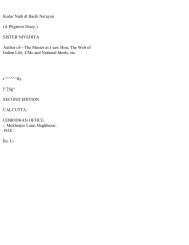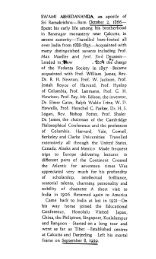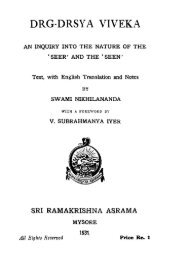<strong>Practical</strong> <strong>Vedanta</strong>idea, and one more difficult to understand. It is nothing less than this, that theImpersonal Being, our highest generalization, is in ourselves, and we are That. "OShvetaketu, thou art That." You are that Impersonal Being; that God for whomyou have been searching all over the universe is all the time yourself — yourselfnot in the personal sense but in the Impersonal. The man we know now, themanifested, is personalised, but the reality of this is the Impersonal. To understandthe personal we have to refer it to the Impersonal, the particular must be referredto the general, and that Impersonal is the Truth, the Self of man.There will be various questions in connection with this, and I shall try to answerthem as we go on. Many difficulties will arise, but first let us clearly understandthe position of monism. As manifested beings we appear to be separate, but ourreality is one, and the less we think of ourselves as separate from that One, thebetter for us. The more we think of ourselves as separate from the Whole, themore miserable we become. From this monistic principle we get at the basis ofethics, and I venture to say that we cannot get any ethics from anywhere else. Weknow that the oldest idea of ethics was the will of some particular being or beings,but few are ready to accept that now, because it would be only a partialgeneralization. The Hindus say we must not do this or that because the Vedas sayso, but the Christian is not going to obey the authority of the Vedas. The Christiansays you must do this and not do that because the Bible says so. That will not bebinding on those who do not believe in the Bible. But we must have a theorywhich is large enough to take in all these various grounds. Just as there aremillions of people who are ready to believe in a Personal Creator, there have alsobeen thousands of the brightest minds in this world who felt that such ideas werenot sufficient for them, and wanted something higher, and wherever religion wasnot broad enough to include all these minds, the result was that the brightest mindsin society were always outside of religion; and never was this so marked as at thepresent time, especially in Europe.To include these minds, therefore, religion must become broad enough.Everything it claims must be judged from the standpoint of reason. Why religionsshould claim that they are not bound to abide by the standpoint of reason, no oneknows. If one does not take the standard of reason, there cannot be any truejudgment, even in the case of religions. One religion may ordain something veryhideous. For instance, the Mohammedan religion allows Mohammedans to kill allwho are not of their religion. It is clearly stated in the Koran, "Kill the infidels ifthey do not become Mohammedans." They must be put to fire and sword. Now ifwe tell a Mohammedan that this is wrong, he will naturally ask, "How do youknow that? How do you know it is not good? My book says it is." If you say yourbook is older, there will come the Buddhist, and say, my book is much older still.Then will come the Hindu, and say, my books are the oldest of all. Thereforereferring to books will not do. Where is the standard by which you can compare?You will say, look at the Sermon on the Mount, and the Mohammedan will reply,look at the Ethics of the Koran. The Mohammedan will say, who is the arbiter asfile:///C|/Documents%20and%20Settings/Chitra%20Selva...oksBySwami/<strong>Practical</strong><strong>Vedanta</strong>/<strong>Practical</strong><strong>Vedanta</strong>PDF.html (26 of 113)2/26/2007 12:24:33 AM
<strong>Practical</strong> <strong>Vedanta</strong>to which is the better of the two? Neither the New Testament nor the Koran can bethe arbiter in a quarrel between them. There must be some independent authority,and that cannot be any book, but something which is universal; and what is moreuniversal than reason? It has been said that reason is not strong enough; it does notalways help us to get at the Truth; many times it makes mistakes, and, therefore,the conclusion is that we must believe in the authority of a church! That was saidto me by a Roman Catholic, but I could not see the logic of it. On the other hand Ishould say, if reason be so weak, a body of priests would be weaker, and I am notgoing to accept their verdict, but I will abide by my reason, because with all itsweakness there is some chance of my getting at truth through it; while, by theother means, there is no such hope at all.We should, therefore, follow reason and also sympathise with those who do notcome to any sort of belief, following reason. For it is better that mankind shouldbecome atheist by following reason than blindly believe in two hundred millionsof gods on the authority of anybody. What we want is progress, development,realisation. No theories ever made men higher. No amount of books can help us tobecome purer. The only power is in realisation, and that lies in ourselves andcomes from thinking. Let men think. A clod of earth never thinks; but it remainsonly a lump of earth. The glory of man is that he is a thinking being. It is thenature of man to think and therein he differs from animals. I believe in reason andfollow reason having seen enough of the evils of authority, for I was born in acountry where they have gone to the extreme of authority.The Hindus believe that creation has come out of the Vedas. How do you knowthere is a cow? Because the word cow is in the Vedas. How do you know there isa man outside? Because the word man is there. If it had not been, there wouldhave been no man outside. That is what they say. Authority with a vengeance!And it is not studied as I have studied it, but some of the most powerful mindshave taken it up and spun out wonderful logical theories round it. They havereasoned it out, and there it stands — a whole system of philosophy; andthousands of the brightest intellects hare been dedicated through thousands ofyears to the working out of this theory. Such has been the power of authority, andgreat are the dangers thereof. It stunts the growth of humanity, and we must notforget that we want growth. Even in all relative truth, more than the truth itself, wewant the exercise. That is our life.The monistic theory has this merit that it is the most rational of all the religioustheories that we can conceive of. Every other theory, every conception of Godwhich is partial and little and personal is not rational. And yet monism has thisgrandeur that it embraces all these partial conceptions of God as being necessaryfor many. Some people say that this personal explanation is irrational. But it isconsoling; they want a consoling religion and we understand that it is necessaryfor them. The clear light of truth very few in this life can bear, much less live upto. It is necessary, therefore, that this comfortable religion should exist; it helpsmany souls to a better one. Small minds whose circumference is very limited andfile:///C|/Documents%20and%20Settings/Chitra%20Selva...oksBySwami/<strong>Practical</strong><strong>Vedanta</strong>/<strong>Practical</strong><strong>Vedanta</strong>PDF.html (27 of 113)2/26/2007 12:24:33 AM
- Page 1 and 2: Practical VedantaPractical VedantaP
- Page 3 and 4: Practical Vedantaworld. If I am a s
- Page 5 and 6: Practical Vedantadifference is only
- Page 7 and 8: Practical VedantaThe ideal of faith
- Page 9 and 10: Practical Vedantamoment of our live
- Page 11 and 12: Practical Vedantaof the Christs and
- Page 13 and 14: Practical Vedanta"This life is Brah
- Page 15 and 16: Practical Vedantadark fifteen days,
- Page 17 and 18: Practical Vedantalife. This is the
- Page 19 and 20: Practical Vedantaeverything would b
- Page 21 and 22: Practical Vedantait is only through
- Page 23 and 24: Practical Vedantawhich is that subt
- Page 25: Practical Vedantanoumenon and pheno
- Page 29 and 30: Practical VedantaAbsolute.The finit
- Page 31 and 32: Practical Vedantawhich is not the q
- Page 33 and 34: Practical Vedantaexperience that th
- Page 35 and 36: Practical Vedantafulfilled. The Jiv
- Page 37 and 38: Practical Vedantabetween the pure r
- Page 39 and 40: Practical Vedantacome out straight.
- Page 41 and 42: Practical Vedantawar with one anoth
- Page 43 and 44: Practical Vedantanobody could under
- Page 45 and 46: Practical VedantaMy idea, therefore
- Page 47 and 48: Practical Vedantathe same methods.
- Page 49 and 50: Practical Vedantavarious minds, all
- Page 51 and 52: Practical Vedantabrotherhood; but t
- Page 53 and 54: Practical Vedantabrotherhood, but w
- Page 55 and 56: Practical Vedantawe all go with ves
- Page 57 and 58: Practical Vedantareason. What can y
- Page 59 and 60: Practical Vedantabeen preached in t
- Page 61 and 62: Practical Vedantathe husband kisses
- Page 63 and 64: Practical Vedantaof the knowledge a
- Page 65 and 66: Practical Vedantafor those who only
- Page 67 and 68: Practical Vedantasun exists because
- Page 69 and 70: Practical Vedantaof death was pleas
- Page 71 and 72: Practical VedantaGod. We must learn
- Page 73 and 74: Practical Vedantaa plague comes, it
- Page 75 and 76: Practical VedantaAtman? "As with a
- Page 77 and 78:
Practical Vedantathat immortal One,
- Page 79 and 80:
Practical Vedantaand the third egoi
- Page 81 and 82:
Practical VedantaWitness of the uni
- Page 83 and 84:
Practical VedantaPractical Vedanta1
- Page 85 and 86:
Practical Vedantaeternal ; every ot
- Page 87 and 88:
Practical Vedantafaculty, Buddhi, w
- Page 89 and 90:
Practical VedantaPractical Vedanta1
- Page 91 and 92:
Practical Vedantastepping-stone to
- Page 93 and 94:
Practical Vedantarecognition? Findi
- Page 95 and 96:
Practical Vedantasentient." This is
- Page 97 and 98:
Practical Vedantaessentially differ
- Page 99 and 100:
Practical Vedantaexistence is limit
- Page 101 and 102:
Practical Vedantalive, for I am lif
- Page 103 and 104:
Practical Vedantasee from Kapila's
- Page 105 and 106:
Practical Vedantalimitation, but th
- Page 107 and 108:
Practical Vedantaperfect, infinite,
- Page 109 and 110:
Practical Vedantaindividuality, of
- Page 111 and 112:
Practical Vedantarepeat [something]
- Page 113:
Practical Vedantaperson who dies in
















